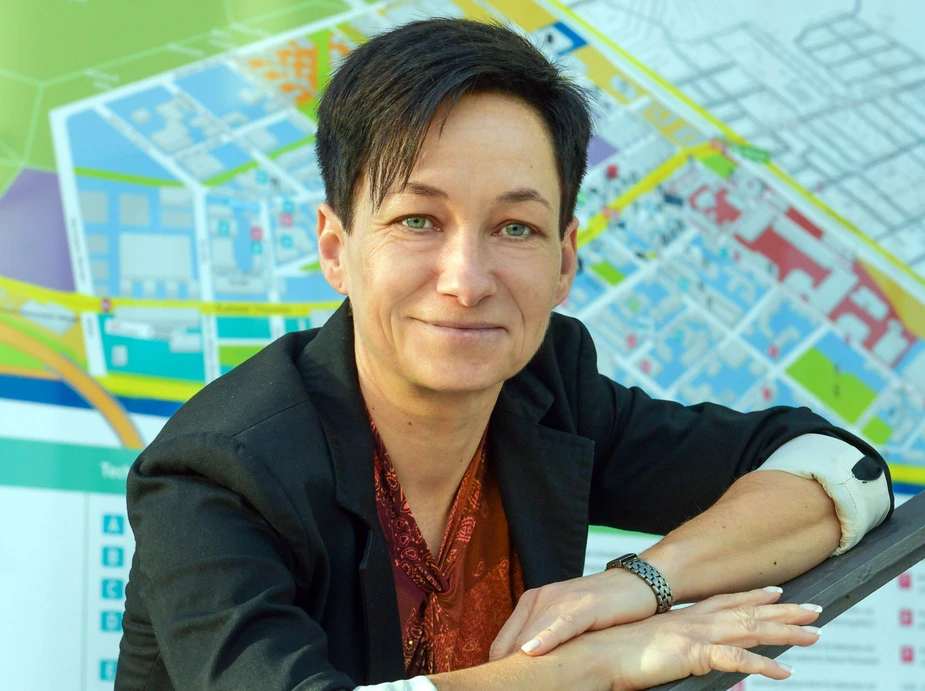Dynamism meets experience
Innovative start-ups and established companies successfully collaborate in the A² Adlershof programme
Finding a parking spot with an app, documenting a house’s mains connections using a smartphone, testing the functionality of your home’s heating with a camera, or checking whether the waste at recycling locations lands in the right containers. Four start-ups, including abaut GmbH, SO NAH GmbH, netpipe GmbH, and ENER-IQ GmbH, are each working on specific aspects of these digital challenges. All these companies are taking part in WISTA Management Gmbh’s A² Adlershof programme, which is all about ‘Smart Cities’ for the second year in a row. ‘The aim is to give young companies coaching during their launch phase, while projects with established companies enable them to gain access to the market and learn more about its demands,’ says Yvonne Plaschnick, WISTA programme manager, sketching out the accelerator’s mission.
The ‘Pitching Day’ in mid-June 2019, when several start-up teams presented themselves in five-minute presentations, was followed by a five-month collaboration of BTB, an energy provider, with the start-ups ENER-IQ and netpipe. Wirtschaftsbetriebe Duisburg (WBD), the company responsible for waste management and parking guidance systems in Duisburg, cooperated with abaut and SO NAH.
David Hoffmann, the head of digital innovation at WBD, values the flexibility of the young founders. The Munich-based start-up ‘abaut’, for example, uses sensors to record the composition of excavated earth on construction sites. WBD, on the other hand, are interested in detecting which type of waste goes in which container. It all started when Hoffman asked: ‘Can you remodel the system, so it detects when a plastic sack goes in the green container?’ When abaut affirmed, the cooperation was official. If the pilot project turns out to be successful, he can imagine further cooperation in container monitoring.
The WBD also saw potential in the business model of Aachen-based company ‘SO NAH’, which uses sensors attached to streetlights to identify free parking spots in cities. ‘Busy recycling locations with long waits could share the current waiting periods with their customers on an app, or point them towards less busy locations,’ says Hoffmann.
The department head for decentral facilities and grids at BTB, Mike Müller, also sees the flexibility of ‘young and dynamic companies’ as an advantage: ‘The accelerator programme helps start-ups to develop their ideas into new products in cooperation with experienced companies.’ This also applies to the project with ‘netpipe’. To date, mains connections, pipes and cables in houses, flats, and other premises, are often insufficiently documented. The Berlin-based company has developed a software that helps to directly locate mains connection using a smartphone on-site. BTB now wants to explore whether this can be expanded to mapping out construction sites.
Making heating systems more efficient using digital solutions is an exciting prospect for energy providers, which is why BTB opted for a project with ENER-IQ. Founded in 2018 and based in Hamburg and Würzburg, the start-up develops smart software that monitors the status of heating systems. This facilitates remote identification and replacement of defective components.
‘Demo Day’ on 29 January 2020 will show how fruitful the collaborative projects between start-ups and experienced companies have been. ‘In addition to trade associations, we will invite policy-makers and journalists as well as stakeholders from other sectors,’ says A² programme manager Yvonne Plaschnick. She is confident that, by the end, Adlershof will have more than one reason to celebrate.
By Paul Janositz for Adlershof Journal
